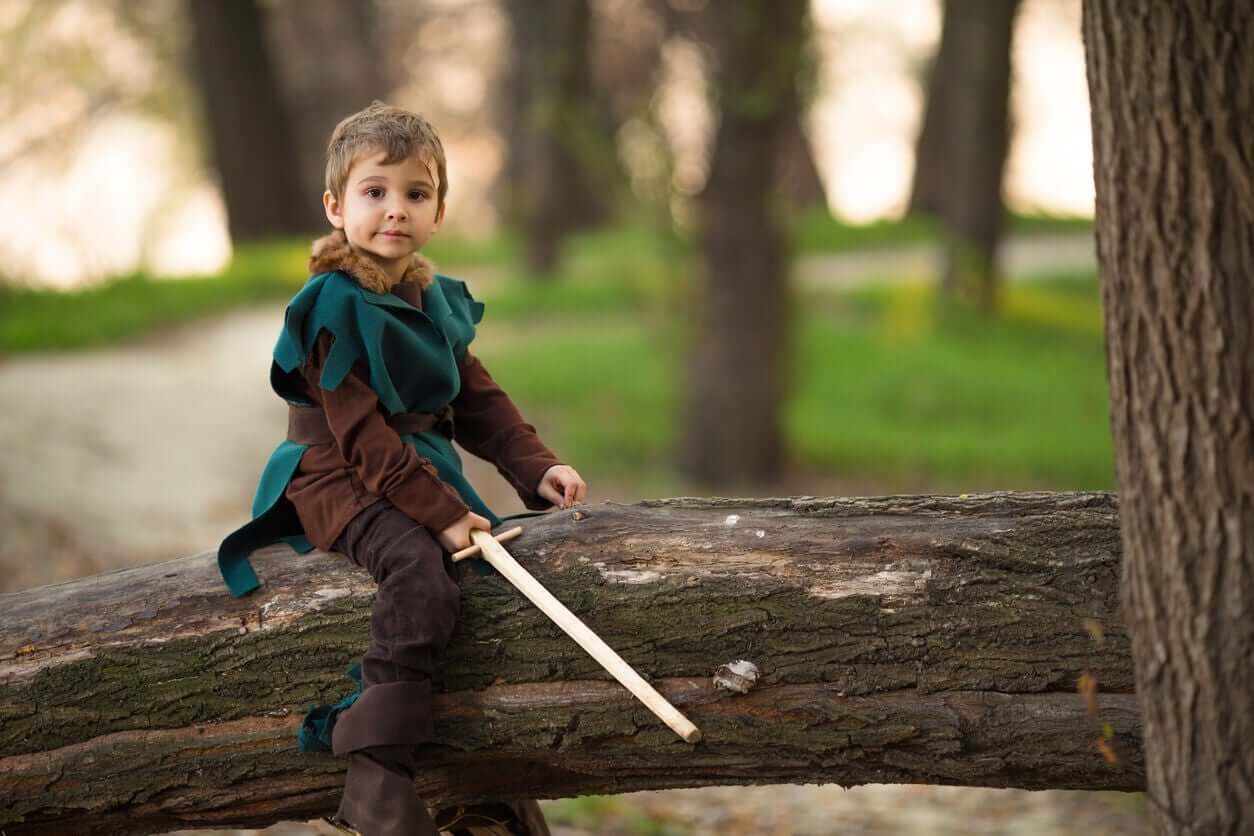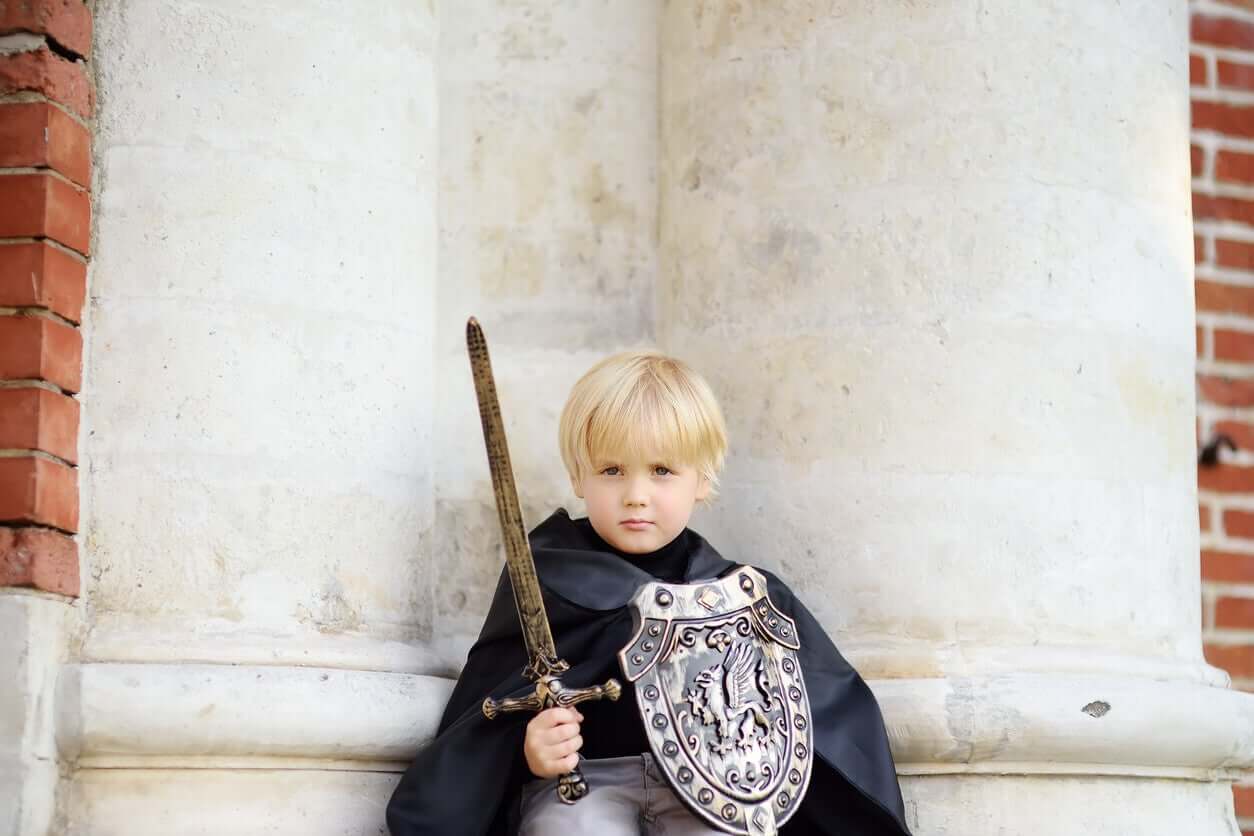22 Medieval Names for Boys

Your family’s about the welcome a new baby and it is time to decide what you’re going to call it. You have many options, but if you’re one of those mothers who like tradition, you’re going to love these medieval names for boys!
Their origins are diverse because, at that time, people were named in relation to some aspect of their life: Their way of being, their trade, or their place of origin.
Now, we invite you to discover the cutest medieval names for boys of all. We hope you find the one you want.
Medieval names, the best option for your child

Next, we’ll share a list of names in alphabetical order:
- Alonso: Comes from the Germanic name Alfonso, which means “prepared for battle.
- Álvaro: A name of German origin and Nordic roots that means “army of goblins”.
- Amadeo: Comes from the Latin Amadeus and refers to the one who “loves God”. It’s made up of the words amare (love) and Deus (God).
- Arturo: A name of Celtic origin, which means “strong as a bear”. It’s one of the most characteristic medieval names for boys of the time because it’s that of the famous British king who inspired many writers.
- Beltrán: This name has a Germanic origin and means “illustrious warrior”.
- Camilo: This name comes from the Latin Camillus, which was the name of the young people who attended religious services in ancient Roman culture.
- Cayetano: A word of Latin origin that referred to the inhabitants of Gaeta, an Italian city.
- Enrico: The Italian form of the English name Henry, which means “prince of the house”.
- Eugene: This name comes from the Greek Eugenios, formed by the elements eu (good) and genos (birth). He is the “man of noble descent”.
- Faust: A masculine name of Latin origin that means “luck”.
- Felipe: Comes from the Greek Fílippos, which means “horse lover”.
- Felix: A Spanish name that derives from Latin and that means “happy” or “lucky”. In ancient times, it was used as a nickname.
- Fernando: A Spanish derivation of Ferdinand, an Anglo-Saxon name formed by the words frith (peace) and nanth (brave or audacious man).
- Gonzalo: Derived from the Latin name Gundisalvus, whose origin is Germanic. It’s made up of the words gund (fight) and salv (sure).
- Guillermo: A Spanish translation of William, a masculine name of German origin that means “brave protector”.
- Hernán:A diminutive of Hernando or Fernando.
- Leonardo: Comes from Leonard, of Germanic roots, which means “brave and strong”.
- Matthias: Comes from the Hebrew Matiyah and means “gift of God”.
- Matthew: Of the same origin as Matthias.
- Rodrigo: The Spanish version of Roderick, which comes from Hroderich, an old German name that’s a composite of the words hrod (fame) and ric (power).
- Thaddeus: The Spanish version of the Aramaic Lebeo. Experts also believe it to be a derivative of the Greek name Theodoros, which means “gift of God”.
- Valentin: A Spanish variant of Valentino, an ancient Roman surname born from the word valente. It means “healthy, strong”.

When names repeat history
The Middle Ages were a very important historical period, during which many important inventions, institutions, and customs emerged for our current society. As an article in the newspaper La Vanguardia states:
“The list is longer than we might suppose: Paper, Arabic numbers, banks, musical notes, universities, notaries, pants, the custom of eating while sitting and not lying down, as in ancient Rome”.
Also, during that time, many names originated. And just as fashion is renewed from time to time, stories repeat themselves and medieval names resurface.
All of these options we’ve shared with you have survived over the years, which speaks highly of them. They’re strong names that are easy to pronounce and to remember. And that’s why they also remain in force.
To conclude, we hope that in this list of medieval names for boys you’ve found the one chosen for your baby. If not, we invite you to keep searching among other thematic listings, based on literature, history, nature, and more. You can even check names that start with a particular letter. On our site, you’ll find hundreds of options!
So, share these magical moments with your family and search together for that ideal name for the child who’s already on the way.
Your family’s about the welcome a new baby and it is time to decide what you’re going to call it. You have many options, but if you’re one of those mothers who like tradition, you’re going to love these medieval names for boys!
Their origins are diverse because, at that time, people were named in relation to some aspect of their life: Their way of being, their trade, or their place of origin.
Now, we invite you to discover the cutest medieval names for boys of all. We hope you find the one you want.
Medieval names, the best option for your child

Next, we’ll share a list of names in alphabetical order:
- Alonso: Comes from the Germanic name Alfonso, which means “prepared for battle.
- Álvaro: A name of German origin and Nordic roots that means “army of goblins”.
- Amadeo: Comes from the Latin Amadeus and refers to the one who “loves God”. It’s made up of the words amare (love) and Deus (God).
- Arturo: A name of Celtic origin, which means “strong as a bear”. It’s one of the most characteristic medieval names for boys of the time because it’s that of the famous British king who inspired many writers.
- Beltrán: This name has a Germanic origin and means “illustrious warrior”.
- Camilo: This name comes from the Latin Camillus, which was the name of the young people who attended religious services in ancient Roman culture.
- Cayetano: A word of Latin origin that referred to the inhabitants of Gaeta, an Italian city.
- Enrico: The Italian form of the English name Henry, which means “prince of the house”.
- Eugene: This name comes from the Greek Eugenios, formed by the elements eu (good) and genos (birth). He is the “man of noble descent”.
- Faust: A masculine name of Latin origin that means “luck”.
- Felipe: Comes from the Greek Fílippos, which means “horse lover”.
- Felix: A Spanish name that derives from Latin and that means “happy” or “lucky”. In ancient times, it was used as a nickname.
- Fernando: A Spanish derivation of Ferdinand, an Anglo-Saxon name formed by the words frith (peace) and nanth (brave or audacious man).
- Gonzalo: Derived from the Latin name Gundisalvus, whose origin is Germanic. It’s made up of the words gund (fight) and salv (sure).
- Guillermo: A Spanish translation of William, a masculine name of German origin that means “brave protector”.
- Hernán:A diminutive of Hernando or Fernando.
- Leonardo: Comes from Leonard, of Germanic roots, which means “brave and strong”.
- Matthias: Comes from the Hebrew Matiyah and means “gift of God”.
- Matthew: Of the same origin as Matthias.
- Rodrigo: The Spanish version of Roderick, which comes from Hroderich, an old German name that’s a composite of the words hrod (fame) and ric (power).
- Thaddeus: The Spanish version of the Aramaic Lebeo. Experts also believe it to be a derivative of the Greek name Theodoros, which means “gift of God”.
- Valentin: A Spanish variant of Valentino, an ancient Roman surname born from the word valente. It means “healthy, strong”.

When names repeat history
The Middle Ages were a very important historical period, during which many important inventions, institutions, and customs emerged for our current society. As an article in the newspaper La Vanguardia states:
“The list is longer than we might suppose: Paper, Arabic numbers, banks, musical notes, universities, notaries, pants, the custom of eating while sitting and not lying down, as in ancient Rome”.
Also, during that time, many names originated. And just as fashion is renewed from time to time, stories repeat themselves and medieval names resurface.
All of these options we’ve shared with you have survived over the years, which speaks highly of them. They’re strong names that are easy to pronounce and to remember. And that’s why they also remain in force.
To conclude, we hope that in this list of medieval names for boys you’ve found the one chosen for your baby. If not, we invite you to keep searching among other thematic listings, based on literature, history, nature, and more. You can even check names that start with a particular letter. On our site, you’ll find hundreds of options!
So, share these magical moments with your family and search together for that ideal name for the child who’s already on the way.
All cited sources were thoroughly reviewed by our team to ensure their quality, reliability, currency, and validity. The bibliography of this article was considered reliable and of academic or scientific accuracy.
- Faure, Roberto. (2002). Diccionario de nombres propios. Editorial Espasa Calpe. España.
- Millán, MC Á. (2013). La revolución del saber a finales de la Edad Media: el nacimiento de la imprenta . Recuperado de http://contenidosdigitales.uned.es/fez/view/intecca:VideoCMAV-5a6f32b1b1111fb50f8b4ed3
- Salazar, S. (2016). El gran libro de los nombres para tu bebé Guía ilustrada de nombres para niño y niña. Barcelona: Planeta.
- Simón Parra, M. (2009). El nombre de persona en la documentación castellana medieval . e_BUAH. Biblioteca digital Universidad de Alcalá.
This text is provided for informational purposes only and does not replace consultation with a professional. If in doubt, consult your specialist.








